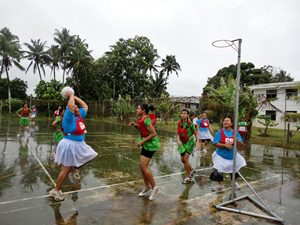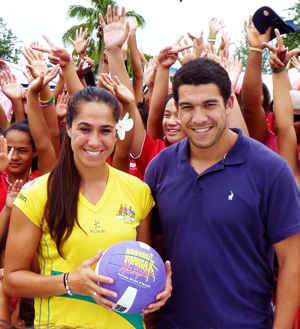The Australian Sports Outreach Program (ASOP) in Tonga won a World Health Organization best practice award on 2 July for its contribution to improving the physical activity of women.
Kau Mai Tonga: Netipolo (Come on Tonga, Let's Play Netball) provides an opportunity for women aged 15 to 45 to participate in netball on a regular basis. The program aims to increase the awareness and risks of an inactive and unhealthy lifestyle.
The World Health Organization identifies 'Promoting public awareness about diet and physical activity, including through mass media' as a key, cost efficient method to address non-communicable diseases. ASOP Tonga uses this approach to increase the physical activity of women and girls. The national netball program has been widely promoted via a media campaign and community activities. The focus of the campaign is to make physical activity 'easy, exciting and everywhere'.
Equally important to creating long term change is ensuring the availability of quality, accessible physical activities. The Ministry of Internal Affairs, in collaboration with the Tonga Netball Association, is increasing the number of village-based physical activity options for women.
The results speak for themselves. Preliminary results from a national media campaign tell us that more than 90 per cent of women were aware of the campaign. More than 370 netball teams–about 3000 women–registered for the first Kau Mai Tonga tournament. This is up from just 27 teams the previous year, before the campaign was launched.
This award recognises the great work ASOP Tonga is doing to address non-communicable diseases in a region where cost-effective and innovative approaches are needed. As part of the award, the World Health Organization will provide US$20,000 to the Tongan Government to strengthen the program's village-based activities and help create long term improvements to the physical wellbeing of women and girls in the country.
Non-communicable diseases, or lifestyle diseases, are the number one killer in the world. More than 94 per cent of women in Tonga are classified as either overweight or obese, consequently losing their quality of life to preventable diseases.
Women in Tonga tend to be less active than men due to a range of cultural factors. This includes sporting activities which are often designed for, and dominated by, men. The low levels of participation in sport stop women from gaining the benefits of regular physical activity.
AusAID supports the positive role that sport can play in health and wellbeing through ASOP, run by the Australian Sports Commission. The program works with government and non-government organisations to increase Pacific Islanders physical activity levels through sport. In Tonga, the program is run through a partnership between the Australian Government, the Tongan Ministry of Health and the Ministry of Internal Affairs.


